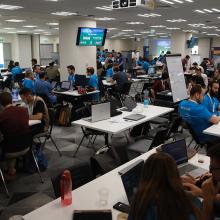News
-

Breaking the Skin
The hardworking minds at Prof. Dror Fixler’s lab developed an optical method for identifying nano-diamonds that penetrate the skin and allow for safe, noninvasive tracking of particles inside body tissue
-

This was 2022
Four new faculty members, more than a few groundbreaking scientific innovations, numerous media publications, plenty of scholarships, grants, and awards, one alumni conference, and a hackathon. The Faculty of Engineering’s end-of-the-year roundup.
-

Dr. Izack Cohen to Launch the Industrial and Information Systems Engineering Program
The program was approved by the University and was submitted for approval of the CHE. In addition, a new modeling and process mining lab is already accepting grad students
Dr. Izack Cohen’s specialty in complex process analysis can be applied to the COVID-19 reality: “The world we live in is one of the processes, a series of interconnected actions performed in order to achieve a certain goal. Caring for a hospital patient, a business process, a complex development project, and even food prep in a restaurant kitchen - they’re all processes. Take the restaurant: If we can automatically identify the state of the situation based on information received from various sensors such as cameras or motion trackers, we can send diners automatic notifications when their dishes are about to arrive, handle possible delays, and even check and see whether or not the dish was prepared according to the recipe,” he explains. “This model can be applied to a variety of complex processes and is also relevant to pandemics. Information received from location sensors, medical inspections, complaints about symptoms, questionnaires filled in by the general public - all can help to analyze the pandemic’s progress, identify actions that lead to elevated infection rates, the conditions in which infection occurs and where the next outbreak would be. For example, a certain activity might only lead to infection under certain conditions of duration, environment, etc. If we could identify specific infection conditions, we could keep doing the activities but avoid one of the infection conditions, thereby decreasing it.”
-

Congratulations, doctoral student Alex Glik
Congratulations, doctoral student Alex Glik of Dr. Shahar Alon's lab, for winning the CHE scholarship for excelling doctoral students in Hi-Tech. Alex's research focuses on the intercellular location of RNA molecules inside nerve cells, using super-resolution imaging and spatial genomics.
-

Nanotechnological radiation to improve cancer treatment
Hayadan.org wrote about doctoral student Eli Varon's research, in which he develops technology for personalized cancer treatment using nano-particles and Machine Learning models.
Photo: depositphotos.com -
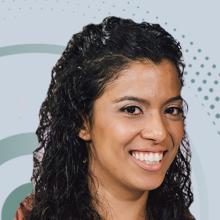
On a Mission to Deliver Drugs Efficiently
Doctoral student Adi Anaki develops tools for delivering drugs via exosomes. Her work has earned her the CHE’s Levzion scholarship.
-
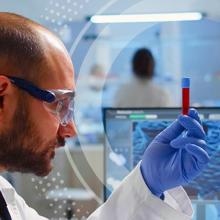
The Faculty of Engineering’s winners of the ISF grants
Earlier this month, the winners of the Israel Science Foundation scholarship were announced, and no fewer than 50 of those are from Bar-Ilan. Culminating at 40 million ILS, the scholarship funds will be divided among the winners, including four faculty members from the Faculty of Engineering.
-

Studying the brain in real environment
Meet Dr. Nisan Ozana, our new faculty member who specializes in neurophotonics: a combination of electro-optics and neuroscience for clinical and functional purposes
-

Cameras: The next step
Imagine a world where security and speed cameras can not only document accidents or crime but also call for help in real-time. Such a system was developed and successfully demonstrated at the Faculty of Engineering’s hackathon
-
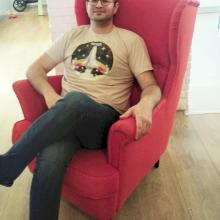
Dr. Ethan Fetaya Teaches Computers How to See
For many animals – humans included – sight is the most dominant of senses. We are able to see an image and easily recognize objects, distinguish between night and day, comprehend what’s at the front and what’s in the back. Computers, on the other hand, still struggle to do that, despite incredible advances in the field. This is one of the challenges currently facing researchers in computer vision: extracting semantic information from an image.
-
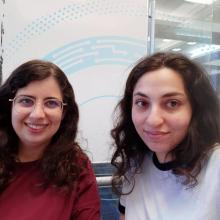
Error Recognition and Formal Verification of Reinforcement-Based Learning
Students Or Reginiano and Eliya Bronshtein’s final project on improving the capabilities of reinforcement-based algorithms using tools of formal validation has been accepted by PyCon
-

First place: Helping pedestrians
Ran, Alon, Alex, and Shiraz created a solution that would prevent pedestrians from being injured at crosswalks. The group has already received funding for a prototype that would be implemented at the university, and later throughout the city of Ramat Gan
-

Second Place: Helping public transportation commuters
Itai, Noam, Elai, Tamir, and Elin came up with a communication system for public transportation which will reduce instances of busses skipping stops, and can pave the way to autonomous public transportation
-
The Secret to a Great Hackathon
Over 200 students participated in the Faculty of Engineering’s main hackathon, held earlier this month and organized in its entirety by students. Noam Shamla, one of the event’s organizers, shares the A-to-Z of a great hackathon
-
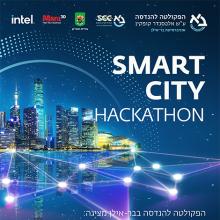
2022 Hackathon: Smart Cities
Want to improve the quality of life in your city? Have a revolutionary idea that could upgrade day-to-day processes in your city or at your university? The Faculty of Engineering is delighted to invite students to sign up for the hackathon, collaborate, experiment, and develop new solutions that tackle the challenges of modern smart cities. The event, sponsored by Intel, will take place on June 2nd.



